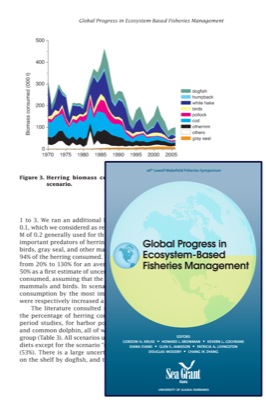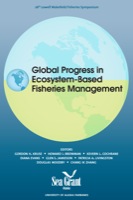
Co-Management of Reef Fisheries of the Snapper-Grouper Complex in a Human Ecological Context in Brazil
A. Begossi, P. Lopes, and R. Silvano
- Price: $2.50 Sale: $0.00
 This is part of Global Progress in Ecosystem-Based Fisheries Management
This is part of Global Progress in Ecosystem-Based Fisheries Management| Format | Price | |
|---|---|---|
| PDF download [502.2 KB] Bypass cart and download |
Free | Add to Cart |
Description
Most commercially important reef fish are late maturing species and have slow growth, being thus vulnerable to overfishing. In Brazil, coastal artisanal fishers usually depend upon reef fishes, such as groupers (Serranidae) and snappers (Lutjanidae), because these fish attain higher market values compared to other fishing resources. Most of these local and small-scale coastal fishers are located in high biodiversity areas, such as the Atlantic forest coastal remnants. Therefore, the management of artisanal reef fisheries faces a dilemma regarding the economic and ecological contexts: to conserve fish stocks (avoid their depletion) or to catch fish to fulfill immediate economic needs. Drawing from examples of different fisheries from northeastern to southern Brazilian coastal sites, we described this dilemma and provided management suggestions, aiming to allow the development of sustainable artisanal fisheries. We recorded data from 1,761 fish landings, sampled and collected 1,453 fish from these landings, and interviewed 585 fishers from 14 fishing communities on the northeastern, southeastern, and southern Brazilian coast. The main reef fish caught by the studied fishers were snappers (12 species) and groupers (16 species), the former more common on the northeastern coast and the second more common on the southern coast. However, some of these reef fishes showed many individuals caught below the size at first maturity, which may adversely affect the exploited fish stocks. In order to change this trend, we suggested that these reef fishes would be best managed through co-management processes, which involve the participation of fishers on where and when to fish. Managing reef fish stocks could thus gain the support of local fishers, if they contribute to the monitoring of reef fishes located close to or in their fishing spots, preferably through economic incentives.
Item details
- Item number: AK-SG-12-01r
- Year: 2012
- DOI: https://doi.org/10.4027/gpebfm.2012.018



